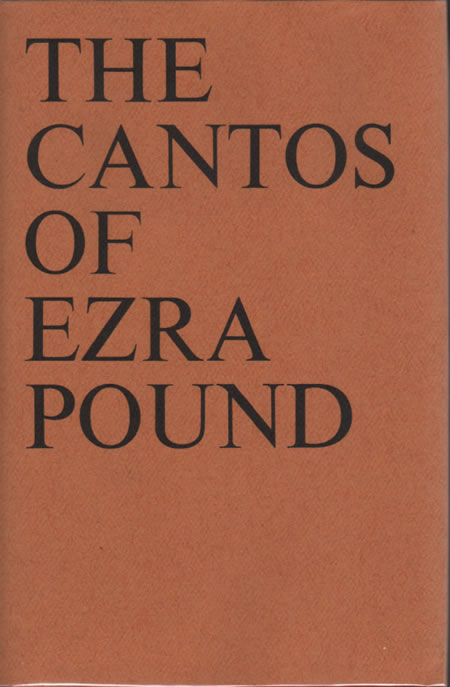Returning to the Cantos

This morning I decided to go back and read a bit of Pound’s Cantos. Copies of this book have been on my shelves since I was a student at Ohio Wesleyan. I have read in it and sometimes find it exceedingly dense. At the same time, It seems like it might be a good addition to my morning poetry read. Right now I’m reading the complete poems of Amiri Baraka and Derek Walcott. These two are helpful to me in different ways. Both are African American and are skilled in their genre. I like Baraka because he has a heavy debt to the “beats” (that’s the Allen Ginsberg group) and also puts lots of jazz and biting political references in his poems. When I purchased the book, I began reading simultaneously from the back and the front hoping to meet somewhere in the middle. I did this because I was very interested in Baraka’s last poems before his recent death which as expected turn an astute critical eye on Amerika.
Walcott sees himself, I believe, as a bit more literary although still brutal in an elegant way. I’m also working my way through Leonard Cohen’s collection, Book of Longing. It will probably remain significant to me that I was reading this collection when he died.

Pound draws me back toward some of my own predilections. The first canto is largely based on Book eleven of the Odyssey. Here’s the Schmoop site with much explication concerning Canto one. Although couched in annoying “user-friendly” language, I still found it helpful. I’m still very interested in Homer, although my Greek text is presently taking me through Aristophanes which has to be a bit more on the frivolous side.
In the present chapter I am working on, the text introduces via the play, “The Clouds,” two new verb tenses bringing to four that it wants me to know by now. It’s very clever how the excerpts of the play flit logicaly between tenses. I am slowing down a bit right now and reviewing the first three readings in the chapter to ensure that I truly have absorbed these tenses and, of course, new vocab before proceeding to the final reading in this chapter.
Music note for this Sunday
We are singing an SAB setting by Hugo Distler of “Savior of the Nations, Come.” In addition I am playing the Toccata, chorale and bicinium of Distler’s organ partita on this tune. I thought it might be a good idea to give listeners a notion of where this music comes from and some of what it’s trying to do. Here’s what I came up with and submitted a few minutes ago.
Music Note Hugo Distler, the composer of today’s prelude, choral anthem, and postlude, is noted for his tragic death at his own hand after being persecuted by the Nazis. But what is more important about him is that his compositions in the years leading up to the war in Germany were directed at restoring church music as art of the highest quality. Although denounced by the Nazis as a creator of “degenerate art,” in fact, Distler aimed at elevating church music. Much like Bach, one of his models, his sacred music is an important contribution to both church music and the wider musical world. Distler created a unique language that can surprise us with its originality. Like all great music, it helps to listen closely. Both the organ music and choral music today are also based on the hymn tune, Nun Komm, der Heiden Heiland (#54 in our Hymnal). The original Gregorian Advent Chant, “Veni redemptor gentium” is attributed to St. Ambrose, It was adapted by Martin Luther as one of his own first vernacular hymns. It is the basis of several organ works by Bach as well as his Cantata BWV 62. Thus today we tap into the heritage of Christian musical art beginning with Ambrose in the fourth century to Luther in the 16th to Bach in the 18th and to Distler in the 20th. submitted by Steve Jenkins, Music Director
Comments, corrections welcome. The sooner, the better.
Suite from Alice’s Adventures In Wonderland: Prologue – Joby Talbot – YouTube
This is a playlist of this ballet. Interesting stuff.
SPLC’s Alabama prisons mental health case moves forward | Southern Poverty Law Center
Sources like the Southern Poverty Law Center will probably become increasingly important in the misinformation spectacle of President Trump and his cohorts.
Fake online news from Macedonia: who’s behind it? – Channel 4 News
Speaking of misinformation I heard parts of this report this morning on the BBC podcast. I found this link to the original TV report. It seems to be working even though I have had problems watching BBC stuff in America before.
A Reflexive Liar in Command: Guidelines for the Media – The Atlantic
More good info about good info.
Fidel Castro, Cuban Revolutionary Who Defied U.S., Dies at 90 – The New York Times
Long obit. I’m about half way through it.
Good music notes! I think you give people a helpful sense of who Distler was, what he was trying to do with his music, and how it fit into the musical and political climate of his day. Love that piece!
Thank you for reading and commenting! I’m glad you think the bulletin note works. I was wondering if you were still reading this silly blog. I’m guessing you’re pretty busy these days.